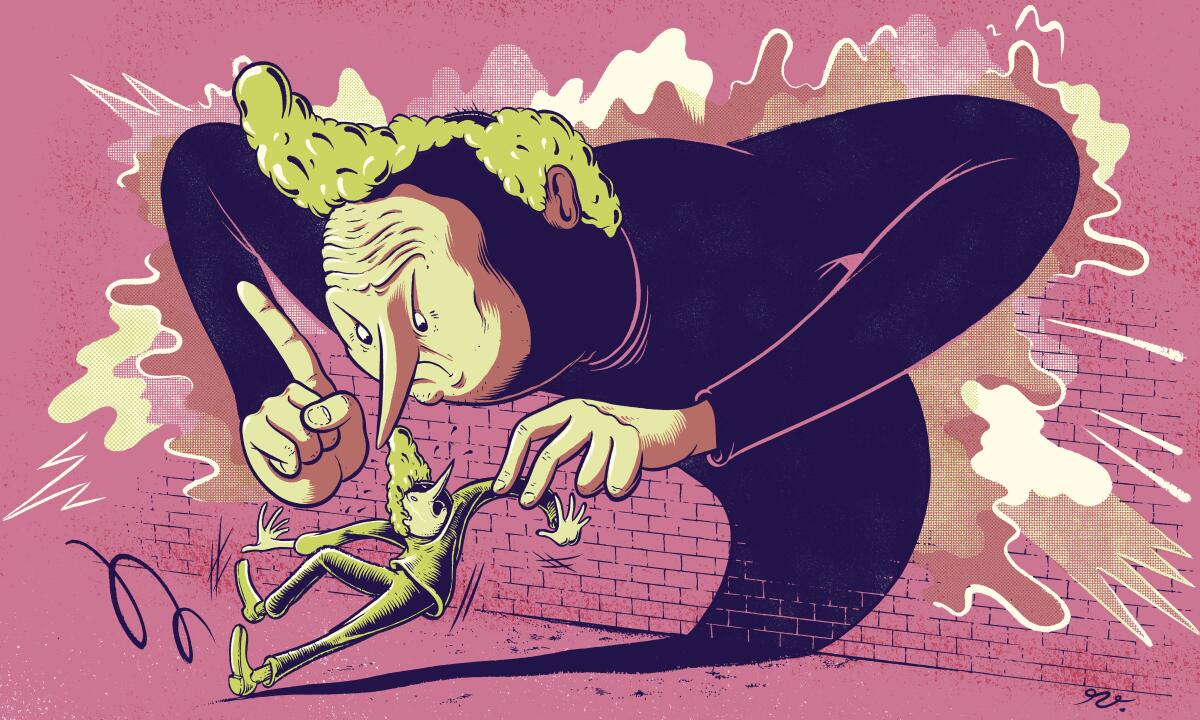Father-son relationships play out in many movies this season, but rarely pleasantly

- Share via
In Trey Edward Shults’ “Waves,” the dad, Ronald (played by Sterling K. Brown), thinks he’s doing all the right things to keep his son on the straight and narrow. But his son Tyler (Kelvin Harrison Jr.) both worships and resents his father’s controlling, exacting micromanaging of his life, and it ends in tragedy.
“Ronald’s shortcoming is in not having an ability to let his son’s voice be heard,” says Brown. “If he gave him the space to let him know how he was feeling, that his perspective had value in the house, he would have been more inclined to share his problems with his father. It’s a lesson in vulnerability — that you have to be a model of vulnerability with your children, so they won’t be afraid to ask for help.”
Tangled, complicated parent-child relationships are frequent fodder for films, but among this year’s awards season contenders, dysfunctional father-son pairings seem to be grabbing a bigger share of the spotlight than usual. “Waves,” “Ad Astra,” “Rocketman,” “A Beautiful Day in the Neighborhood,” “Honey Boy” and even the dark comedy “Knives Out” all circle around the legacy of pain, heartbreak and redemption that complicate and tangle those specific family bonds.
“What we were trying to do was a fable, a myth,” explains “Ad Astra” director James Gray, who also co-wrote the screenplay with Ethan Gross, in which an astronaut son (Brad Pitt) goes searching for his father (Tommy Lee Jones), who disappeared during a space expedition. “There were two concepts: a movie in space, and fathers and sons. The father does abandon the son, and the son has to deal with that anguish for the rest of his life. It’s painful, but acknowledgment of it can lead to transcendence of the damage done.”
“Knives Out,” meanwhile, has a whole family of dysfunctional relationships, including three very different men — a son (Michael Shannon), a son-in-law (Don Johnson) and grandson (Chris Evans). They all have issues with their powerful patriarch (Christopher Plummer), who ends up dead in the comic whodunit.
“This stuff is a bottomless well from which to draw drama,” says writer-director Rian Johnson. “We all have parents and none of us get that relationship quite right, so in fiction we try to examine all the various facets by which we screw it up.”
In “A Beautiful Day in the Neighborhood,” star Matthew Rhys plays a cynical journalist assigned to cover one of the most gentle of father figures — Mister Rogers (Tom Hanks) — shortly after throwing a punch at his own dad (Chris Cooper). Rhys became a father himself a little over three years ago, and says playing Lloyd gave him fresh insight into his real-life parental and parenting relationships.
“My patience with him as a toddler was questionable, and that’s ridiculous — because he is a toddler. What Fred Rogers did so well was point out that I could see the world through my child’s eyes, rather than my own.”
— Matthew Rhys
“I don’t think it’s possible that you don’t analyze yourself,” he says. “The greatest generational constraints and societal constraints on my father were significant, and I realized I was falling into the same trap with my own son. My patience with him as a toddler was questionable, and that’s ridiculous — because he is a toddler. What Fred Rogers did so well was point out that I could see the world through my child’s eyes, rather than my own.”
Johnson has played on the father/son theme before in his other films (like 2012’s “Looper”) and says writing these stories are ways to work through his own interpersonal issues with his late father. “I had a wonderful father who I had a very complicated relationship with, but the only option to me in terms of interrogating that relationship with him now is through fiction,” he says.
That’s clearly what’s happening in other films coming out this year; “Honey Boy” focuses on the legacy a volatile father leaves on his child actor son, while “Rocketman” looks back at how Elton John’s rigid, judgmental father made it so hard for his flamboyant son to be himself.
But perhaps it’s not really a surprise that these films are clustering together as prestige pictures in 2019: American society is grappling simultaneously with a re-examination of gender roles and autocratic-leaning government figures these days.
“With the position of the president and what he’s said about women, it’s important to have these stories about toxic masculinity and how we combat it”
— James Gray
“These stories are timeless,” says Gray. “But with the position of the president and what he’s said about women, it’s important to have these stories about toxic masculinity and how we combat it… Art works as a metaphor so we can understand human beings in a clearer way. Our job is to show the folly of repeating the mistakes we’ve made.”
Rhys sees “Neighborhood” through a similar lens, but one that looks to a brighter future. “As someone who comes from Wales and now lives in the U.S., I see two kinds of national patriarchal disasters going on,” he says of both countries. “Maybe there’s a part of us that likes to live in hope — where we see the patriarchal figure do the right thing.”
Whatever the reason, the father-son and parent-child relationship will undoubtedly be a subject filmmakers return to, almost out of instinct. “It’s the deepest well we could possibly have,” says Johnson. “Especially if you’re wrestling with it in your own life, it’s an irresistible thing to dive into. I can’t imagine ever feeling like we’ll exhaust that topic.”
More to Read
Only good movies
Get the Indie Focus newsletter, Mark Olsen's weekly guide to the world of cinema.
You may occasionally receive promotional content from the Los Angeles Times.










